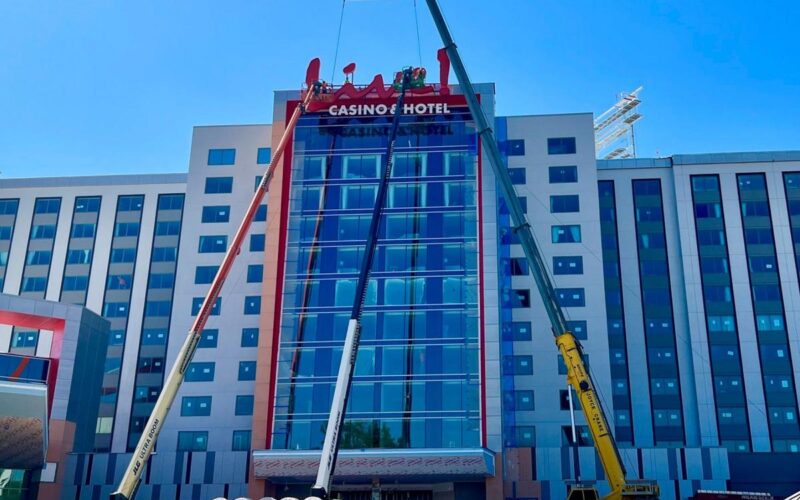Published in cooperation between Bazoom and the Gilroy Dispatch
Nevada is known for its casinos, especially in cities like the iconic Las Vegas, where land-based casinos have been popular for decades. However, while you can walk into almost any casino in Nevada to gamble, playing those same games online is much more limited. This raises the question: why are land-based casinos legal and so highly favored in Nevada, while online casinos face more restrictions?
Nevada and casinos go way back as it was the first state to legalize gambling back in 1931. Over the years, its land-based casinos have grown into a major part of the economy. Places like the Las Vegas Strip generate billions of dollars every year, making gambling a huge part of the state’s identity.
On the other hand, online gambling has not been embraced in the same way. While Nevada did legalize online poker and sports betting in 2013 with Assembly Bill 114, other forms of online casino games, like slots and table games, remain off-limits.
This decision is partly to protect the profits of land-based casinos, which could be hurt by people choosing to gamble online instead of visiting physical locations.
Despite this, Nevada’s top-rated gambling sites have grown in prevalence. This is because, according to Sam Barnard, online casinos can be licensed out of state and accessed from the state so players do have access to a wider range than one might think. Add on the fact that many of these online casinos provide generous bonuses, a wider gaming selection, and greater convenience, and it becomes clear why many people actually prefer them.
However, the state’s gambling laws still do favor in-person play to protect these brick-and-mortar casinos. As the American Gaming Association reports, another reason for this difference is the challenge of regulating online casinos. Keeping track of who is running these websites and ensuring they follow the rules is more difficult than overseeing land-based casinos, which are tightly regulated by Nevada’s gaming authorities.
By limiting online gambling, Nevada ensures that players are only participating in casinos that are closely monitored and meet the state’s strict legal standards. Nevada is not the only state with laws that favor land-based gambling over online options. Many other states also have rules in place that make it easier to gamble at a physical location than online.
However, because Nevada is home to such a large number of casinos, this legal divide is much more noticeable. Tourists can easily find places to gamble in person, but online options are limited mainly to poker and sports betting.
Despite the restrictions, some people are pushing for Nevada to loosen its rules on online casinos. Advocates argue that online gambling could bring in more revenue for the state by tapping into a market that already exists. Many people in Nevada and beyond are already gambling online using offshore websites, so regulating and taxing online casinos could help Nevada’s economy even more.
Experts in the gaming industry also point out that online casinos are more convenient for players. Instead of traveling to a casino, people can enjoy games from the comfort of their own homes.
Still, there are concerns about expanding online gambling in Nevada. Opponents worry that legalizing more forms of online casinos could hurt the state’s famous land-based venues. If people can gamble online, they may be less likely to visit places like Las Vegas, which would affect tourism and the state’s economy.
Additionally, there are worries about issues like underage gambling and addiction, which are harder to control in an online environment compared to a physical casino. Interestingly, Nevada does allow some forms of mobile gambling, but only within casino premises.
For example, visitors to a casino can use mobile devices to gamble, but the moment they leave the casino, they can no longer play. This limited approach allows land-based casinos to offer some digital options without fully opening up the online market.
According to a 2024 report from Slots Temple, Nevada’s gaming industry has been thriving, with record-breaking revenue last year. Many believe that opening up online gambling more widely could disrupt the success of land-based casinos, which remain a major draw for tourists.
Some lawmakers fear that fully legalizing online casinos might lead to job losses or fewer visitors coming to the state, especially if players can access similar games online. Despite these concerns, the debate about online gambling is far from over as the state needs to plan for an economic future beyond gambling one day. As technology evolves and new gaming options like virtual reality casinos emerge, the line between online and offline gambling is becoming less clear.
Some believe Nevada may eventually allow more types of online casino games, but only if they can create a system that balances the needs of land-based casinos with the growing demand for digital gaming.
For now, land-based casinos are still the heart of Nevada’s gambling industry. While online gambling options remain limited, there’s no doubt that the conversation about expanding these options will continue in the coming years. As the state navigates this issue, it will have to find a way to maintain its position as a top gambling destination while also adapting to the future of online gaming.



